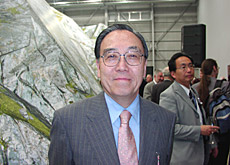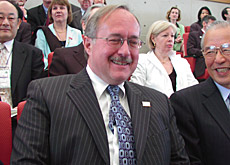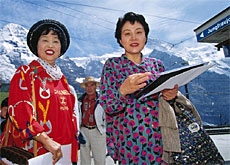“Japan can learn a lot from Switzerland”

A former Japanese ambassador to Switzerland believes his compatriots have much to learn from the alpine nation.
In an interview with swissinfo, Takaji Kunimatsu also said the 2005 World Expo would help to challenge traditional perceptions of Switzerland in Japan.
Kunimatsu served as Japan’s ambassador to Switzerland from 1999 to 2002.
He has written a book on his experience of living in the country and was invited to attend Swiss Day at the Expo.
The global exhibition, attended by 121 countries, is currently underway just outside the Japanese city of Nagoya.
Kunimatsu is a former head of Japan’s National Police Agency. He is best known for leading investigations into the 1995 sarin gas attack on the Tokyo subway.
He is currently chairman of a non-profit organisation promoting the use of helicopters in emergency medical treatment.
swissinfo: You were Japan’s ambassador to Switzerland for three years. What was your experience of the country?
Takaji Kunimatsu: I very much enjoyed my time in Switzerland. During my term of office I had the opportunity to meet many Swiss people and visited 20 cantons. Wherever I went I never had the feeling that Switzerland was an isolated country.
swissinfo: Why do you think Switzerland is so popular as a tourist destination with the Japanese?
T.K.: Lots of Japanese say they plan to visit Switzerland and many who go there return to see more of the country. But the focus of people’s interest is a little bit limited to the [tourist clichés]. Many Japanese visit Switzerland to see beautiful mountains, eat chocolate and buy high-quality watches.
They are not interested in the political system, the country’s social structure or Swiss culture. So when I was posted to Switzerland I tried to make the Japanese understand Switzerland in all its aspects.
Of course the most attractive things are the beautiful scenery and natural resources. But I’d like the Japanese people to see [another side to the country]. In my book I tried to show what Switzerland is all about. Of course it is a good thing to love Switzerland for its natural beauty. But there really is much more to the country than that.
swissinfo: Could the Swiss pavilion at the 2005 World Expo help to change the opinion the Japanese have of Switzerland?
T.K.: I think the Expo is a very good opportunity for Japanese people to have a much more comprehensive understanding of what Switzerland is like. Here [in the pavilion] visitors can see not only beautiful mountain scenery but also achievements in technology and the cream of Swiss innovation. All this will provide the Japanese with an [added] incentive to visit Switzerland.
swissinfo: The theme of Expo 2005 is “nature’s wisdom”. Japan doesn’t seem to have made as much progress as Switzerland when it comes to things like protecting nature and recycling. Is there room for improvement?
T.K.: The Japanese can learn a lot from the Swiss, who have already done so many innovative things in terms of protecting the environment and initiating recycling programmes. There should be more of this in Japan. But many people are becoming increasingly aware of the importance of [safeguarding natural resources] and we are catching up.
swissinfo: In what other fields can Switzerland and Japan learn from each other?
T.K.: Well, one thing that comes to mind is how the two countries are dealing with globalisation. Switzerland is not a member of the European Union but is confronted with EU enlargement. I think the Swiss are trying to balance preserving their own identity with [the force of] globalisation. Switzerland also has a long history, has never suffered defeat [in war] and sometimes finds it difficult to catch up [with the pace of change].
We Japanese are in a similar situation. We have a long history and have problems catching up [with the rest of the world]. So Japan and Switzerland could have an exchange of views, get to know each other better and learn how to cope with the challenge of adapting to a new era.
swissinfo-interview: Christian Raaflaub in Aichi, Japan
Takaji Kunimatsu served as Japanese ambassador to Bern from 1999 to 2002.
Kunimatsu has written a book about Switzerland in which he challenges traditional Japanese perceptions of the alpine nation.
He is the former head of Japan’s National Police Agency. Ten years ago he was shot and severely wounded as he was carrying out investigations into the 1995 sarin gas attack on the Tokyo subway.

In compliance with the JTI standards
More: SWI swissinfo.ch certified by the Journalism Trust Initiative



You can find an overview of ongoing debates with our journalists here. Please join us!
If you want to start a conversation about a topic raised in this article or want to report factual errors, email us at english@swissinfo.ch.